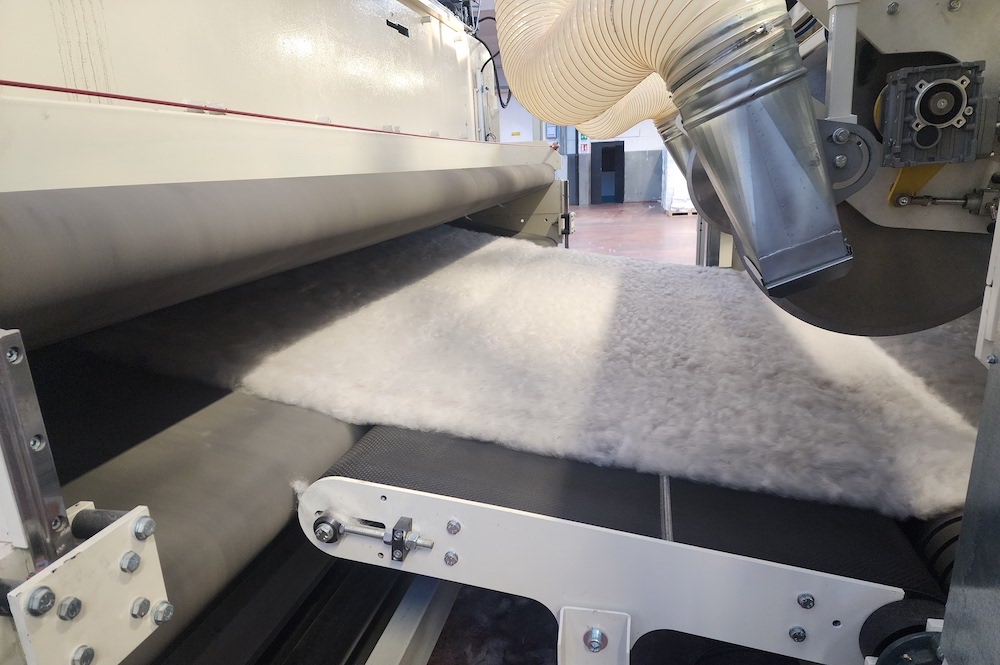
Opinion: Financing Canada’s transition from a hydrocarbons to carbohydrates economy
October 10, 2023
By Camille Saltman
INCA Renewtech's Camille Saltman says it's time for government and industry in Canada to capitalize on the tremendous market opportunity of bio-composites.
 The manufacturing INCA’s PrePregs. Photo: INCA Renewtech.
The manufacturing INCA’s PrePregs. Photo: INCA Renewtech. Artificial intelligence, for all its potential benefits, is gobbling up investment dollars while reducing jobs, consuming vast amounts of electricity, and increasing carbon emissions. In contrast, encouraging investment in advanced bio-based composites made from Canada’s agricultural resources would have the polar opposite impact.
While our friends to the south have struggled to enact national legislation, Canada has been legally cultivating hemp for decades for plant-based protein. The leftover stalk contains some of the strongest natural fibres on earth. If properly refined, it can be manufactured into composites for the automotive, marine, wind energy, and consumer products industries and more.
Hemp bio-composites offer a tremendous market opportunity. They are less expensive, lighter, stronger, and far more sustainable than the glass reinforced plastics and timber products they replace.
Major corporations globally are seeking to integrate more sustainable materials into their end products. Companies like SAFRAN Aerospace, Toyota, Mercedes Benz, Faurencia, Gurit, IKEA, Mitsubishi, Beneteau, Winnebago and countless more are actively partnering with innovation companies like ours to support development of natural fibre bio-materials. In INCA’s case, we’ve developed patented bio-composites for automotive interiors, cores of wind turbine blades and boat hulls, recreational vehicle sidewalls and bioplastics.
There are plenty of market drivers. The EV transition in the transportation industry makes light weighting vital. The shortages and skyrocketing prices of rainforest plywood and balsa wood are forcing manufacturers to seek alternatives. Plastics waste is a global crisis. In fact Canada and the EU have already banned single use plastics.
From farm to factory floor the potential economic benefits of this expanding industry are astronomical. When farmers sell their hemp seed to processors and simultaneously sell their “waste” to companies like INCA, this dual revenue stream will make hemp one of the most profitable crops in the Prairie. When fibre processing and composites manufacturing are performed domestically, hundreds of good paying jobs are created. It’s a win-win for all of us.
At the nascent stage this sector does receive a great deal of public support through NSERC Discovery Grants, IRAP, Sustainable Development Technology Canada, and SR&ED tax incentives. Canadian early stage venture capital funds are also stepping up including The51 Food & Ag Tech Fund, Conexus Venture Capital, Tallgrass Ventures, Pangaea Ventures and Natural Products Canada.
The result? Canada is developing a rich ecosystem of early stage bio-material researchers and raw material processors. At the other end of the spectrum, once a company is well into revenues, private equity and commercial banks can provide financing along with government organizations like Emissions Reduction Alberta, Export Canada, AFSC, Farm Credit Canada, and the Strategic Innovation Fund.
Unfortunately, pre-revenue companies, even those with developed products and customer traction, currently face huge barriers to entry. Often these are large projects that involve building a capital intensive manufacturing facility with a long build-out timeline.
Venture and private equity investors have scaled back investment radically in 2023 due to economic uncertainty, sharply higher interest rates, an IPO drought and the failure of Silicon Valley bank. Unfortunately, current government funding programs are also not designed for this type of pre-revenue deal. BDC Sustainability Venture Fund, Climate Tech Fund II, and the Industrial Innovation Venture Fund shy away from asset-heavy projects and invest instead in digital technologies requiring small capital infusions and pre-manufacturing stage innovation.
All these factors are hindering growth of projects that could have a transformative impact on the Canadian economy. But is it realistic to expect Canada could play a leadership role in bio-composites?
France, by comparison is a world leader in growing hemp and flax to manufacture natural fibre composites for the European automotive market. They took an early lead in this space thanks to their robust ecosystem of automotive, truck, building and construction, electronics, consumer goods, wind energy, aerospace and marine manufacturers.
Canada has the opportunity to play a similar role in North America with our 20-year head start growing hemp, our climate, and investment to date in agriculture, genetics, fibre processing, and advanced manufacturing.
To promote this sector new types of financial support will be needed, such as backstop agreements to enable companies to secure capital commitments from a broader range of investors including family offices and corporate venture arms. It’s time for government and industry to capitalize on this opportunity before it slips through our fingers.
 Camille Saltman is chief marketing and sustainability officer of INCA Renewtech, and the co-author of “Turning Biomass into Business”, a chapter of BioProducts: Green Materials for a Circular and Sustainable Economy, published by De Gruyter.
Camille Saltman is chief marketing and sustainability officer of INCA Renewtech, and the co-author of “Turning Biomass into Business”, a chapter of BioProducts: Green Materials for a Circular and Sustainable Economy, published by De Gruyter.
Print this page